Contents
- Traditional Games
- Kabaddi (Hututu)
- Langdi
- Champol
- Surparambi
- Lagori
- Kancha
- Pakhanya/Garadya
- Sticker
- Khade (Game of Stones)
- Bhovara/Top
- Patanga/Kite
- Competitive Sports
- Cricket
- Football
- Athletics
- Boxing
- Sport Personalities
- Atharva Taide
- Darshan Nalkande
- Sports Infrastructure
- Lal Bahadur Shastri Stadium
- Punjabrao Deshmukh Krishi Vidyapeeth Stadium
- K.W. Fitness Centre
- Spurti Yoga Studio
- Cheema Sport M.P. Sport
AKOLA
Sports & Games
Last updated on 18 July 2025. Help us improve the information on this page by clicking on suggest edits or writing to us.
Traditional Games
Kabaddi (Hututu)
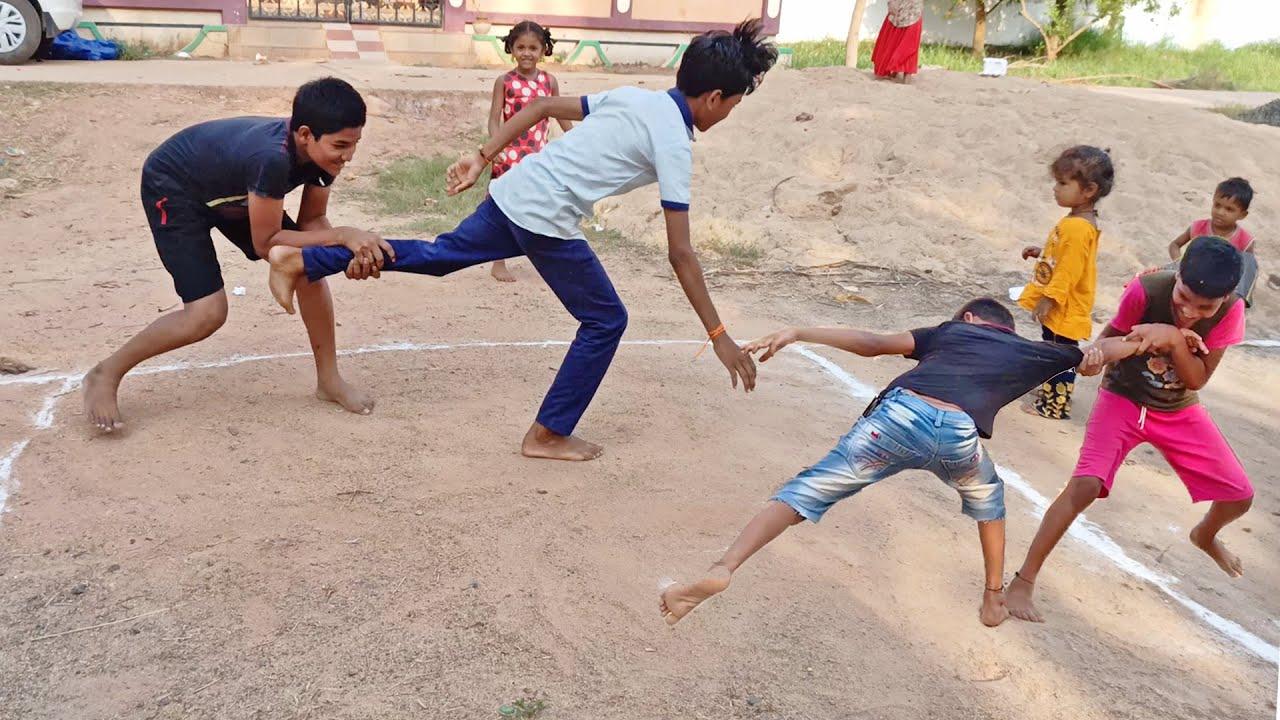
Villages like Karla and Patur host annual Kabaddi matches, where teams from different villages compete against each other. Keliveli, a village in Akot taluka, is particularly renowned for hosting numerous state-level and national Kabaddi tournaments since 1990. Ramkrishna Adhe established the Hanuman Krida Mandal in Keliveli in 1942, contributing significantly to the game's popularity.
Langdi
Langdi is a popular traditional game played in villages across Akola. It involves running while hopping on one leg, which not only requires skill and strategy but also helps improve stamina and leg strength. Langdi competitions are organized at school and district levels, and the game has gained popularity national.
Champol
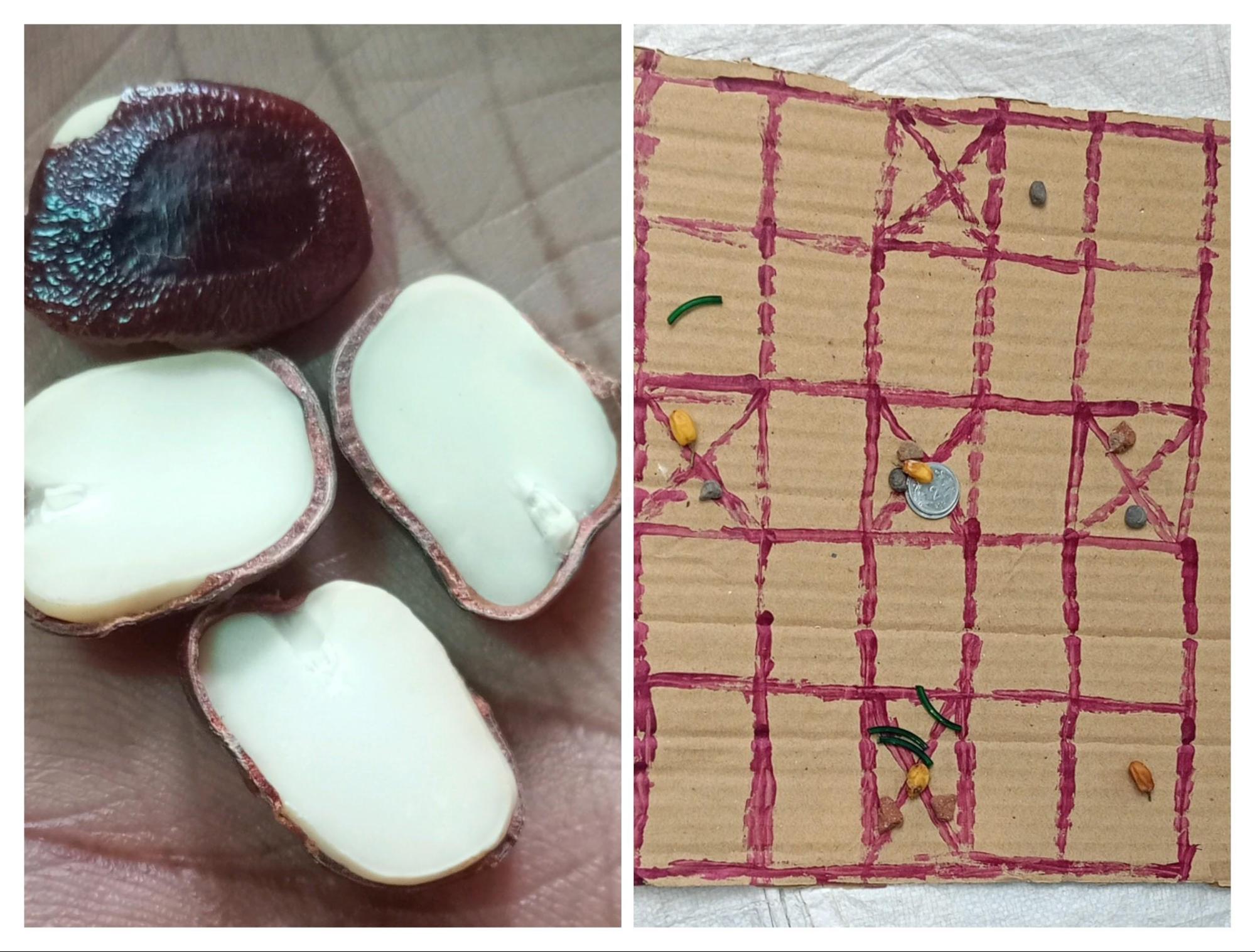
The board, known as "Gat," is made of wood and marked with six horizontal and six vertical rows. Seeds of tamarind, called "Chinchoka," are used as game pieces. Players score points based on the position of the seeds (white or red side up) when they fall on the board. (There are 4 champol made with 2 seeds split through the middle. If one of them fell on white side then 1 point, if 2 fell then 2 point and 3 fell then 3 point but if all fell then it 8 points. All the champol fell on red side then it will 4 points. Maximum 4 players and minimum 2 players can play this game).
Surparambi
Surparambi is a traditional game played primarily on banyan trees, which are known for their large and sturdy branches that provide ideal platforms for the game. This game is enjoyed by a large number of players at once. Players gather around a banyan tree and form a circle by holding hands. Players choose sides mentally by visualizing a black or white side. The first three players to match sides get to continue playing, while the others step out. The player whose turn it is must form a circle under the tree. One player takes a stick, bends it, and throws it away from the circle. The player whose turn it is must run to retrieve the stick before returning to the tree and climbing it. If another player touches the stick before the player whose turn it is, the turn passes to them. If a player fails to touch the stick before it is touched by another player.
Lagori
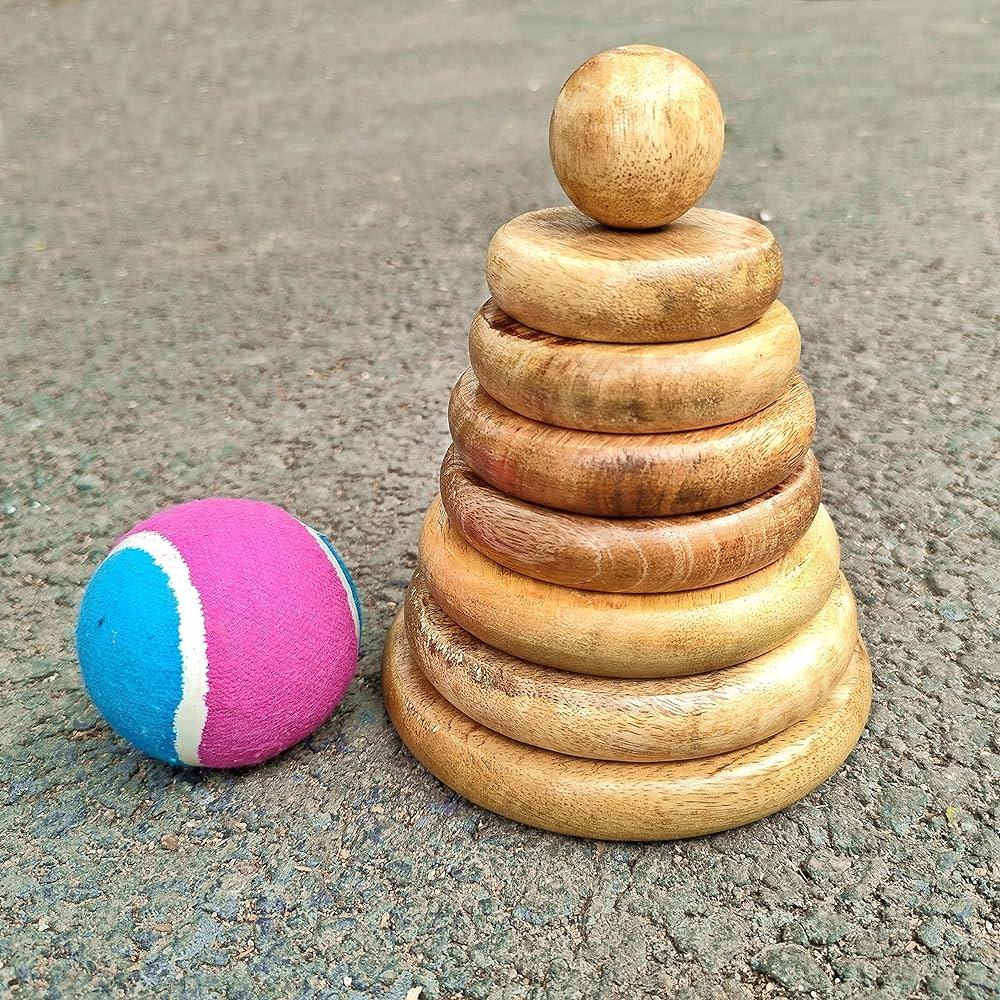
The game begins with all players standing around a circular arrangement of these stones, which is called a lagori. Players take turns hitting the ball to knock down the stones. If a player is able to do so, the opposing team must try to restore the stones back to their original position before the ball can be recovered. If a player is struck by the ball while in the process of restoration, they will be considered out and not get points for that round. The instruments needed are often made in a makeshift form from bricks, socks, stones and paper.
Kancha
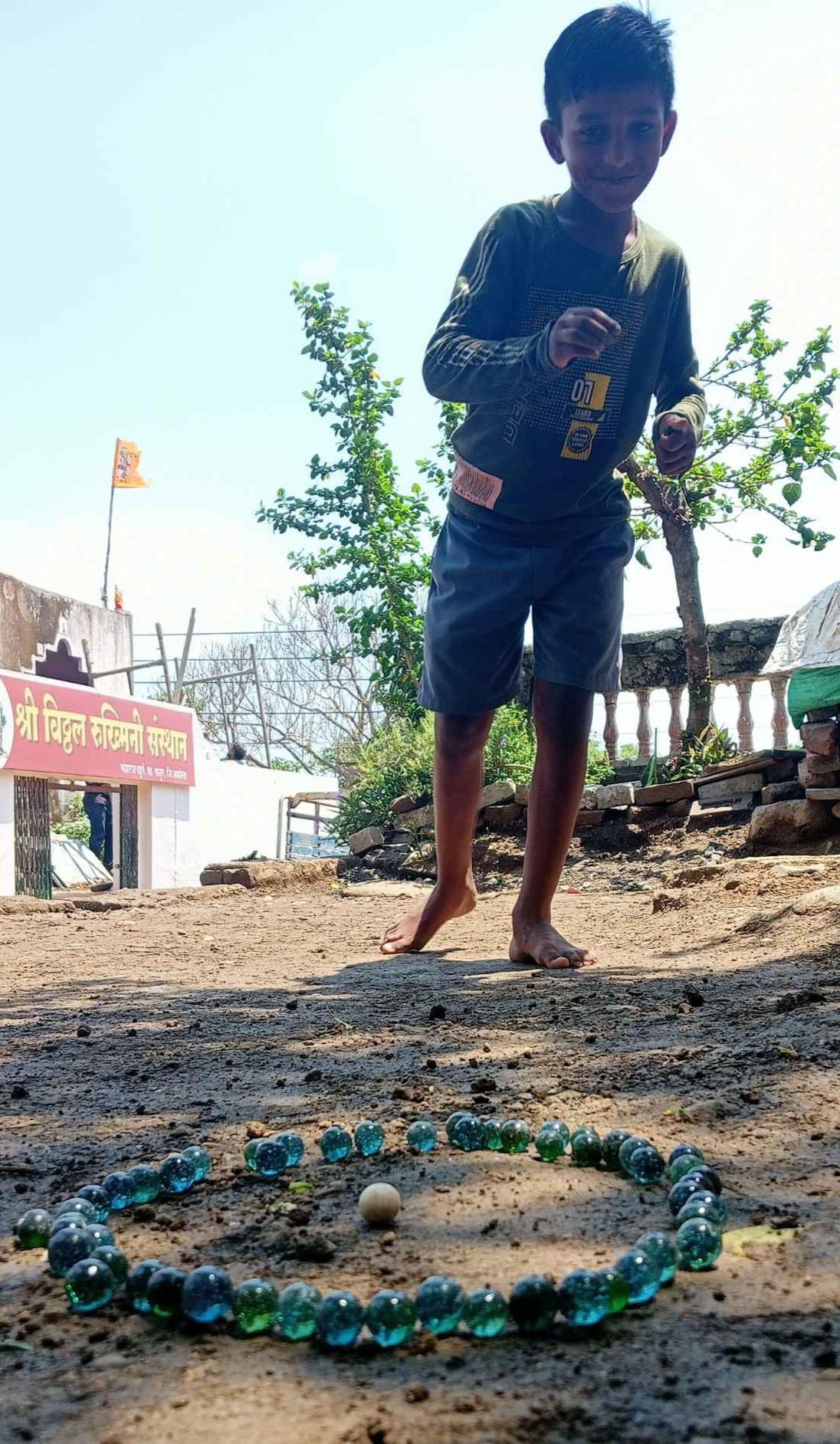
The game involves making different shapes or symmetries on the ground and placing one marble (kancha) in the center. Players take turns hitting marbles with other marbles, aiming to strike the marbles other than the one in the center, known as Dhoja (धोजा). The player who successfully hits the Dhoja and other marbles gets to keep them. Players use their middle finger to stretch and hit the marbles from a predetermined distance. Kancha is a game of skill, precision, and strategy, and it is enjoyed by children and adults alike in various parts of India, including Akola.
Pakhanya/Garadya
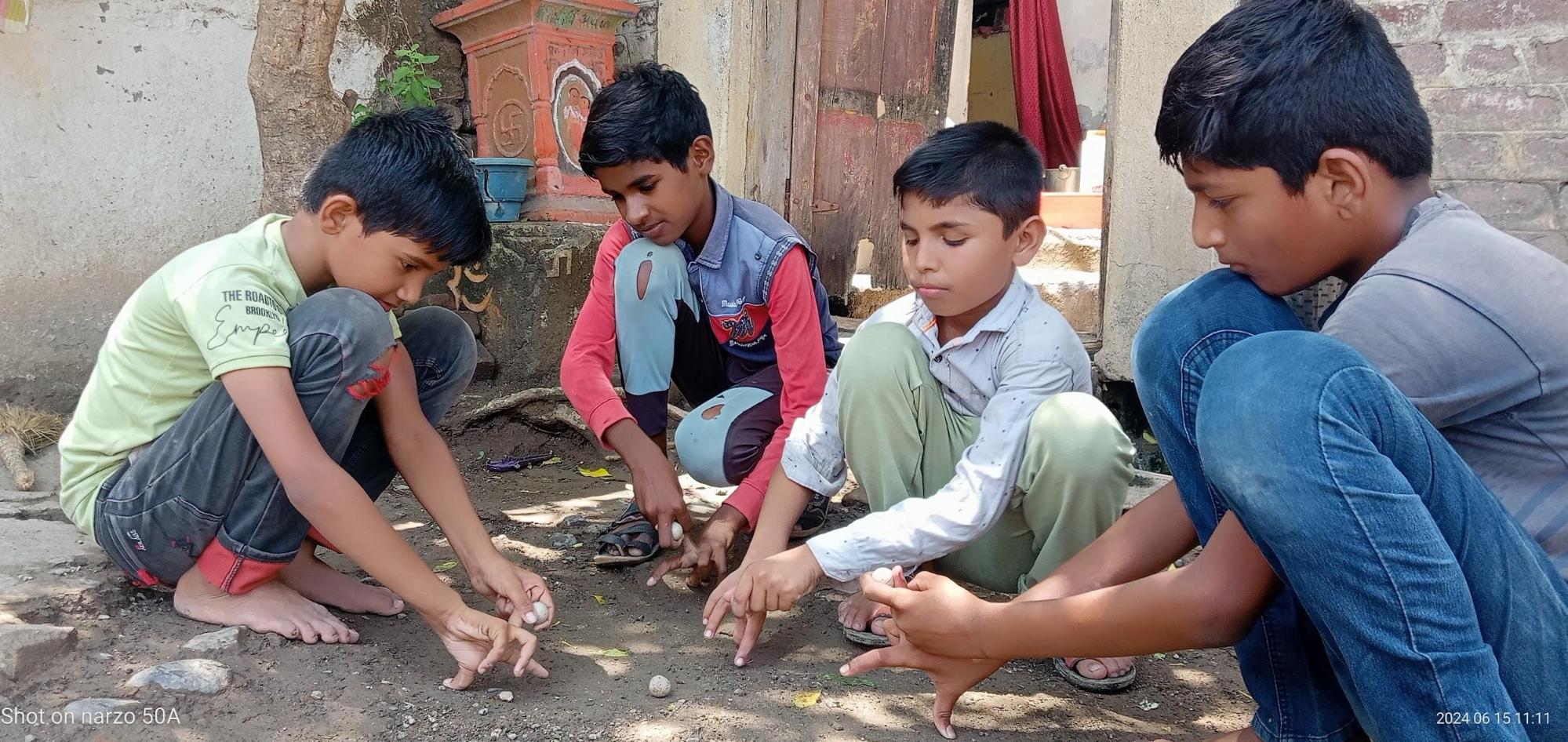
Pakhani, also known as Garadya is a traditional game similar to Kachalya, played with balls made of china clay or stone in villages. The balls are handmade by shaping stones into a circular form. The game is played by holding the ball in the left hand and striking it with the stretched middle finger of the right hand. The objective is to either hit another ball or place the ball into a hole called "maggal," which is made to the size of the ball. If a player is left-handed, the game can be reversed accordingly.
There are two main methods of playing Pakhani:
- Raja-Rani Method: In this method, all players throw their balls towards the maggal. The player whose ball lands closest to the maggal goes first. The points earned depend on the distance between the maggal and the ball. The player who reaches the maggal first hits the other balls. The player who successfully hits is called the "queen" and must retrieve the ball with a clenched fist and bring it back to the maggal. If the "king" is up next, he can displace the queen from the maggal. Sometimes, players must pick up the ball with one hand and place it in the maggal by its corner, called "Kandhopar."
- Dahavis (10-20) Method: In this method, all players place their balls near the maggal. The player closest to the maggal goes first and "sae," which means to go into the maggal. They then hit all the balls. Each hit counts as 10, 20, 30, etc., depending on the scoring system. The player continues hitting until they reach a score of 100, or another predetermined number. They then hit two more times to score 110 and 120. Other players repeat this process. The last player remaining must perform a "Kandhopar" or take three steps to place the ball. If the ball touches another player, they must take steps again. If they miss, they must say "Bitti" in 1 or 2 breaths, running to the maggal.
Sticker
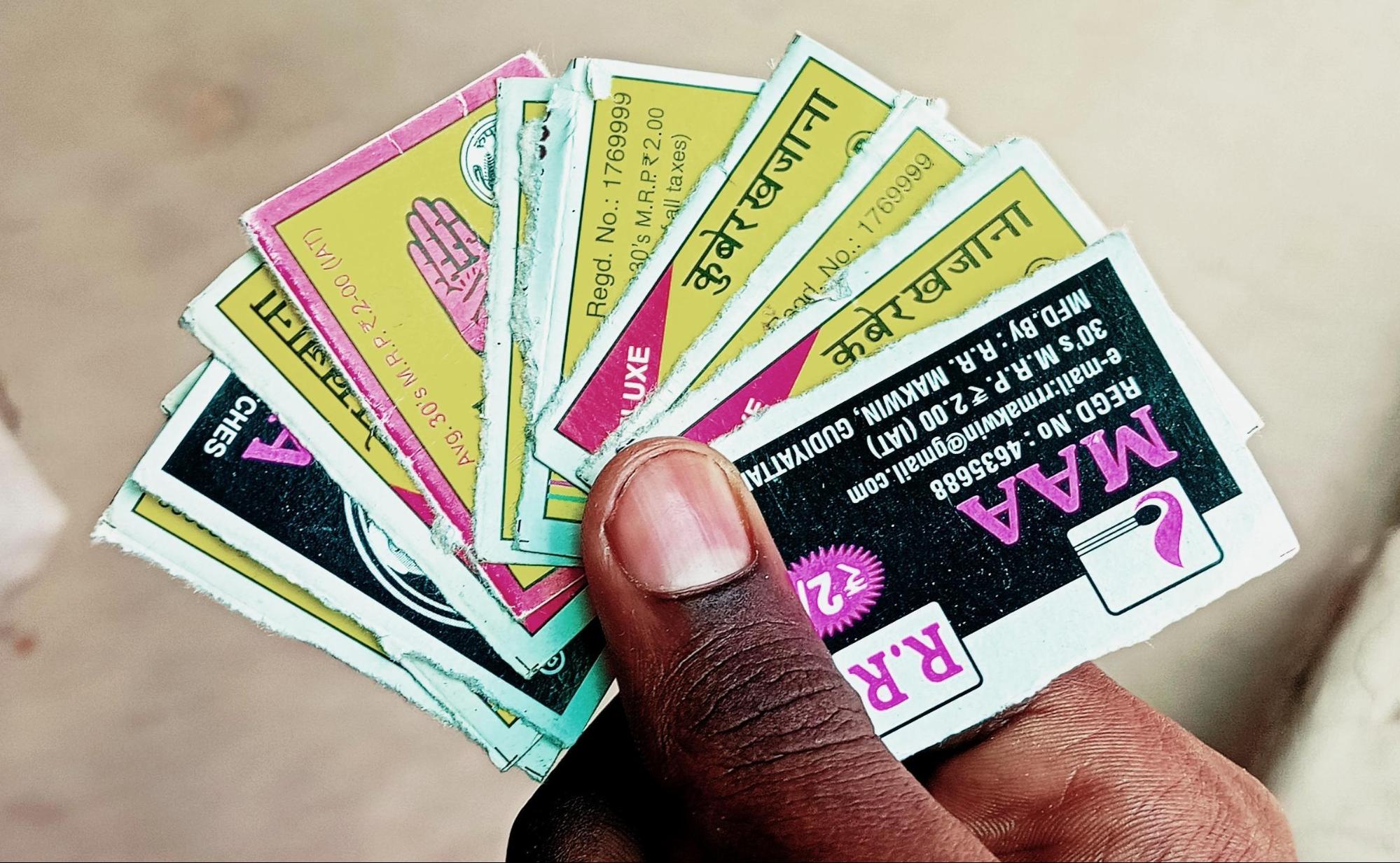
Once the matchbox is empty, the cards are removed by tearing the box open with scissors. These cards are then used to play the game. To begin, all players take their cards and place them upside down in a stack. Players then take turns placing one card on top of another, alternating turns. If a player places a card that matches the card dropped from the first, they win all the cards. Sometimes, instead of placing the cards on the ground upside down, they are placed one at a time.
Khade (Game of Stones)
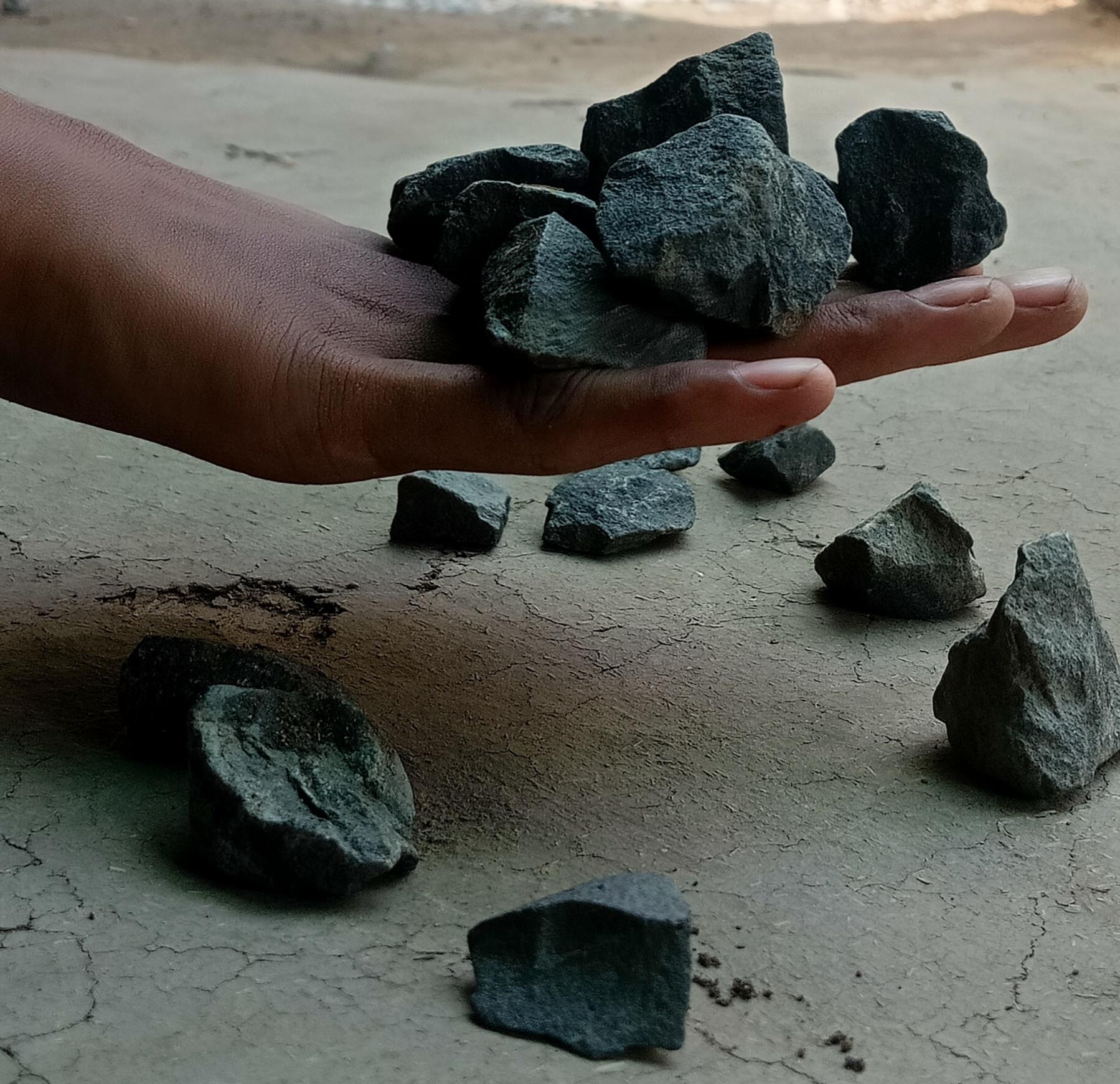
Another method of playing involves using five stones. In this variation, players catch only one stone at a time and collect them one by one. The next time, they catch one stone and collect it in pairs. They repeat this process, collecting stones in groups of three pairs and two pairs. Finally, they collect all five stones at once, making a triangle shape with the thumb and index finger of both hands.
The game concludes when all five stones are placed on the ground, and players collect them using only their two index fingers, ensuring no sound is made. If a mistake is made during this process, the player must restart from the beginning.
Bhovara/Top
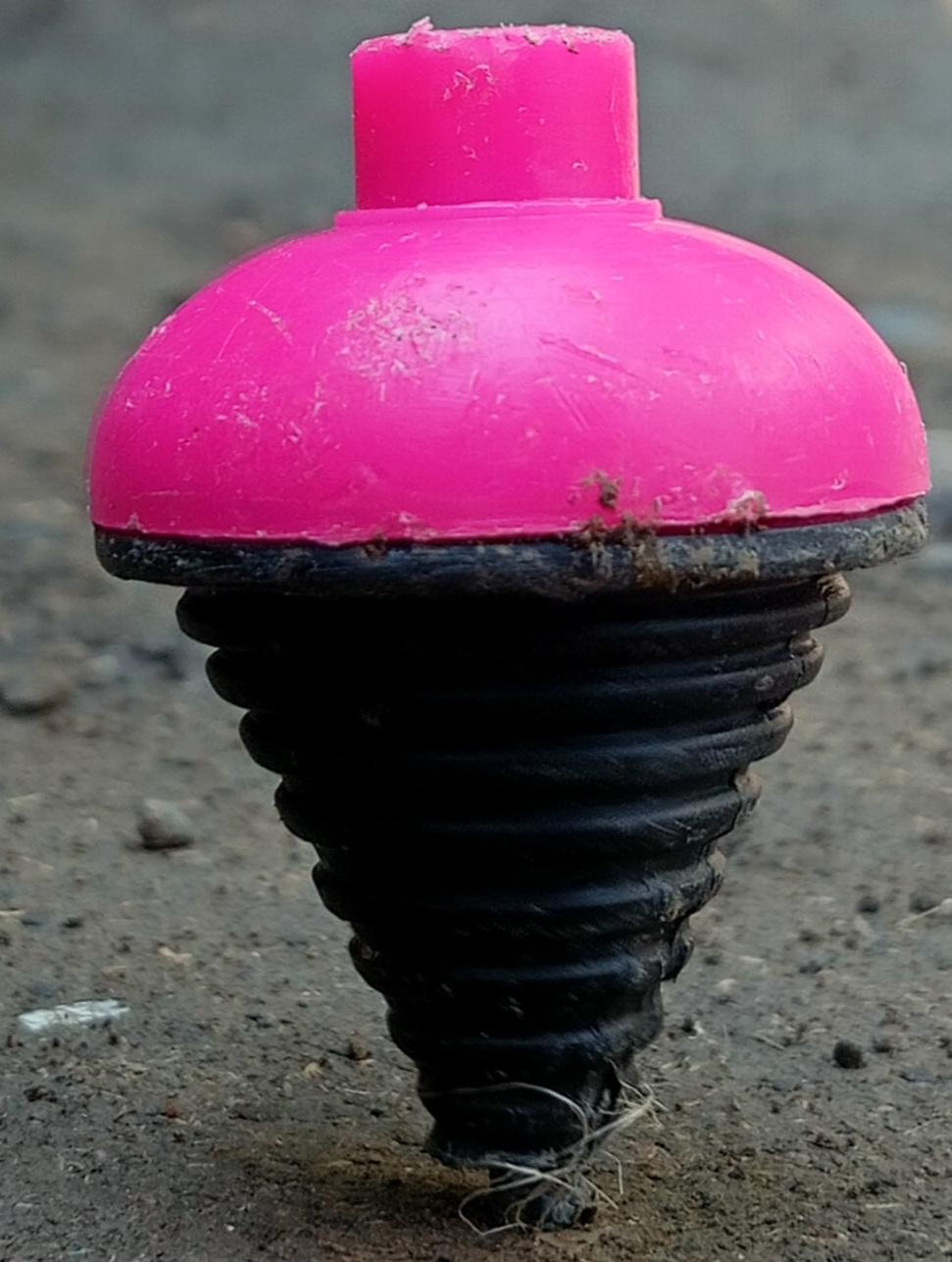
A spinning top game was once popular in villages and is now experiencing a resurgence with modern variations. Players spin a top and compete to see whose top spins the longest or performs the most tricks
Patanga/Kite
![On the occasion of Makar Sankranti, a kite competition is held where participants use cotton thread to fly their kites. People from all over gather on open grounds or in specific areas to fly their kites.[1]](/media/culture/images/maharashtra/akola/sports-games/on-the-occasion-of-makar-sankranti-a-kite-_YlLtNDF.jpg)
The sky is filled with colorful kites, and a sound system plays music to motivate and add to the festive atmosphere. Children also participate in their separate competitions, and prizes are awarded to the winners. Additionally, laddus are distributed to all participants and spectators. In some cases, a competition is held to see who can cut the most kites while flying.
Competitive Sports
Cricket
![The Akola Cricket Club[2]](/media/culture/images/maharashtra/akola/sports-games/the-akola-cricket-club2-bf62fe9d.jpg)
Cricket is immensely popular in Akola, with numerous clubs and academies nurturing young talent. The Vasant Desai Stadium hosts local and national cricket matches, providing a platform for aspiring cricketers to showcase their skills.
Football
![The 2024 Akola Jr. Boys Team in theInter District Football Championship organized by WIFA[3].](/media/culture/images/maharashtra/akola/sports-games/the-2024-akola-jr-boys-team-in-theinter-di_wrrl8OK.png)
Football is gaining popularity in Akola, with several clubs and leagues contributing to its growth. The Lal Bahadur Shastri Stadium hosts local football matches and tournaments.
Athletics
Athletics enjoys a significant following in Akola, with athletes participating in various track and field events. The city hosts athletic meets that attract participants from across the state and country.
Boxing
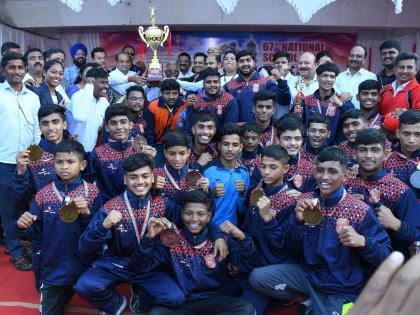
The Vasant Desai Stadium in Akola has become a hub for boxing tournaments, including national-level competitions that draw participants from all over India. These events showcase the city's capabilities in hosting major sporting events and nurturing boxing talent. The Vasant Desai Stadium hosted the 76th National School Boxing Tournament.
Sport Personalities
Atharva Taide
![Atharva Taide is a cricketer from Akola who as of 2025 plays for Sunrisers Hyderabad in the IPL[4]](/media/culture/images/maharashtra/akola/sports-games/atharva-taide-is-a-cricketer-from-akola-wh_8DwPCtw.jpg)
Atharva Taide is a cricketer from Akola who made his List A debut for Vidarbha in the 2018–19 Vijay Hazare Trophy and participated in the Indian Premier League (IPL) 2024 as a part of the Punjab Kings team. He is known for his batting prowess and has represented India in various domestic tournaments. He as of 2025 plays for the Sunrisers Hyderabad in the IPL (Indian Premier League).
Darshan Nalkande
![Darshan Nalkande as of 2025 plays for Delhi Capitals in the IPL[5]](/media/culture/images/maharashtra/akola/sports-games/darshan-nalkande-as-of-2025-plays-for-delh_aSgVZJS.png)
Darshan Nalkande is another cricketer from Akola who made his debut for Vidarbha and has been part of several domestic tournaments. He is recognized for his bowling skills and has been a key player in the local cricket scene. He made his List A debut for Vidarbha in the 2018–19 Vijay Hazare Trophy on 2 October 2018. He made his first-class debut for Vidarbha in the 2018–19 Ranji Trophy on 1 November 2018. He also previously played for Punjab Kings (2019-21), Gujrat Titans (2022-24), and as of 2025 plays for Delhi Capitals in the IPL (Indian Premier League).
Sports Infrastructure
Lal Bahadur Shastri Stadium
![Established in 2003, the Lal Bahadur Shastri Stadium has a seating capacity of 20,000[6]](/media/culture/images/maharashtra/akola/sports-games/established-in-2003-the-lal-bahadur-shastr_YNjVe1L.jpg)
Established in 2003, the Lal Bahadur Shastri Stadium has a seating capacity of 20,000 and hosts cricket and football matches. It serves as a focal point for local sports events and community gatherings, promoting sportsmanship and community engagement.
Punjabrao Deshmukh Krishi Vidyapeeth Stadium
![The Punjabrao Deshmukh Krishi Vidhyapeeth Stadium[7]](/media/culture/images/maharashtra/akola/sports-games/the-punjabrao-deshmukh-krishi-vidhyapeeth-_PmDZAbH.jpg)
The Punjabrao Deshmukh Krishi Vidhyapeeth Stadium is another prominent sports facility in Akola, supporting a range of athletic activities and events. It provides a platform for athletes to train and compete at various levels.
![TheAkola Cricket Club[8]](/media/culture/images/maharashtra/akola/sports-games/theakola-cricket-club8-ffe397b6.jpg)
Established in 1983, the Akola Cricket Club has been instrumental in nurturing cricket talent in the region. It provides coaching facilities and hosts local tournaments to promote the sport at grassroots levels, contributing to the development of young cricketers.
K.W. Fitness Centre
Known for its comprehensive fitness programs and expert trainers, K.W. Fitness Centre is a popular choice among fitness enthusiasts in Akola. It offers state-of-the-art equipment and group fitness classes to promote overall health and well-being.
Spurti Yoga Studio
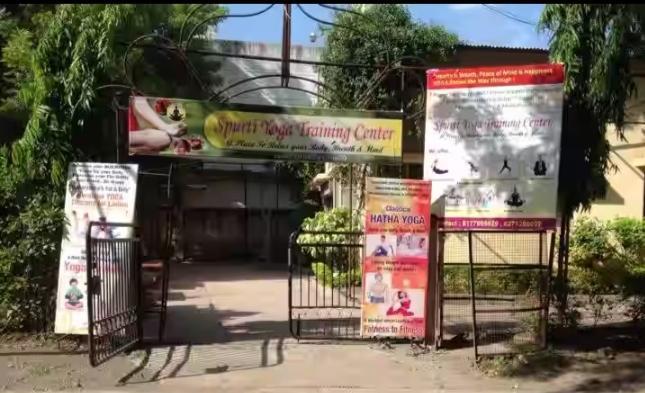
Specializing in yoga and meditation practices, Spurti Yoga Studio offers classes that promote physical well-being and mental relaxation. It provides a serene environment for yoga enthusiasts to practice and connect with their inner selves.
Cheema Sport M.P. Sport
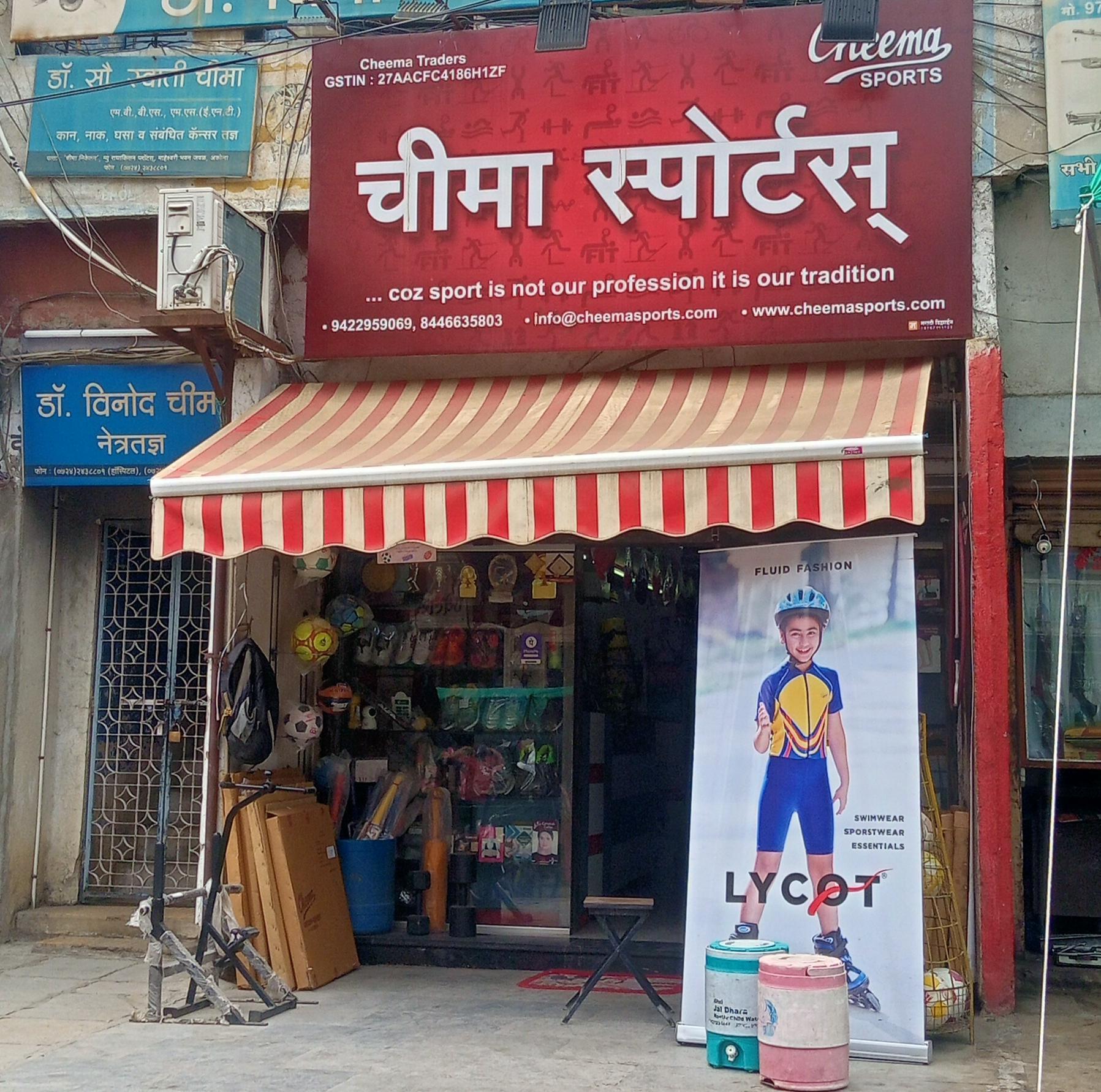
Cheema Sport and M.P. Sport are popular sports shops in Akola, catering to the sporting needs of the local community. They provide equipment and apparel for a wide range of sports, supporting both amateur and professional athletes.
Last updated on 18 July 2025. Help us improve the information on this page by clicking on suggest edits or writing to us.